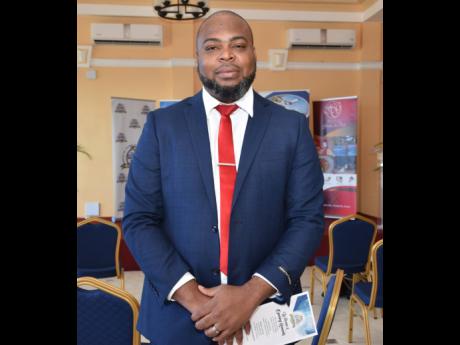After rejecting the gun, pastor steers Lilliput youth away from violence
WESTERN BUREAU:
There was a time when most boys would play with toy guns. But for Howard Nelson, he could have had a real gun if he wanted to from as early as age six as his father, who was the deputy don of Rema in Kingston, let him pull the trigger of a fiream during a New Year’s gun salute.
Many years later, 35-year-old Reverend Howard Nelson, who once lived in a tenement yard and a crime-plagued community, today stands in the pulpit of the Lilliput New Testament Church of God in St James, directing youngsters away from the path he was once exposed to and pointing them to a better alternative for life.
Speaking at the Montego Bay Chamber of Commerce and Industry’s (MBCCI) recently launched security summit at the Grand-A-View Hotel in Montego Bay on March 31, Nelson shared his story.
In a Gleaner interview later, Nelson said that his father eventually walked away from a life of violence.
“But, unfortunately, my father was gunned down by his former cronies when I was 10 years old.”
At age 12, Nelson and his brother were offered protection by his uncle, the then don of Jarrett Lane, Mountain View, but even then, they weren’t prepared to take up the gun.
“’Your father is gone now so if anyone ‘dis’ you, come tell me and I will deal with it. As a matter of fact, you deal with it’,” Nelson said his uncle suggested.
“He then handed us a gun for protection but we didn’t accept it,” Nelson explained.
The reverend told The Gleaner that the reality of crime not being the answer was cemented for him with an epiphany he had at age 14.
“War was happening so we had friends, cousins and uncles on the corner holding off the ends. Then it hit me, they were not in their beds sleeping and were protecting the area and protecting the don. The don was in his bed or somewhere else and not with them,” Nelson shared.
Though he was not a top student, at that point in grade nine, the young Nelson realised that his main focus was getting a solid education.
“It didn’t make any sense because to me, it was you sacrificing your sleep and life for someone else. There were things I witnessed and friends and family members of mine were being killed,” said Nelson.
Nightmare life
Life was a constant nightmare back then, living in a yard where rival gangs would target and shoot, fire-bomb and vandalise his and family members’ houses.
“When the war was intense, we slept under the bed and in sneakers in case we had to run. The rival gangs wanted to ensure they could hurt as many people as possible,” Nelson recalled.
The young reverend stated that leaving his community created somewhat of a ripple effect, as some cousins claimed they didn’t know there was another life.
Today, the Excelsior High School past student is a college graduate and is proud his siblings have also taken the right path.
One of his brothers is now a teacher, another a fitness trainer, one a lawyer and a fourth works with the Ministry of National Security.
“They reached out and told me that they didn’t know they could do something else than just being a gunman. I was elated that many of them made changes in their lives and put down the gun,” he told The Gleaner.
Having started a football team, Nelson coached several young men, especially those who were so-called violence producers. Over 30 young men were playing for the church’s football team.
“What impacted me is that one of the top-tier gang members on the team expressed that he wanted to learn how to be less violent. He stated that when playing football he had so much aggression and he wanted to do harm, especially knowing he had a gun,” he explained.
By his account, living in the inner-city means you cannot give the impression that you are soft; rather, you are expected to react. However, he has striven to change that mindset.
“When the young man showed that he wanted to be less aggressive, I realised I was making an impact on him. I always use my story, especially when talking to the teenage boys that come to church or in the community,” said Nelson.
“I let them know the guns you might see, the violence might be at your doorstep but you do not have to take up that path. The community or family does not define who you are and I want them to understand that they, too, can set a trend and be an example. Let someone else see a better way and change your life and future.”

